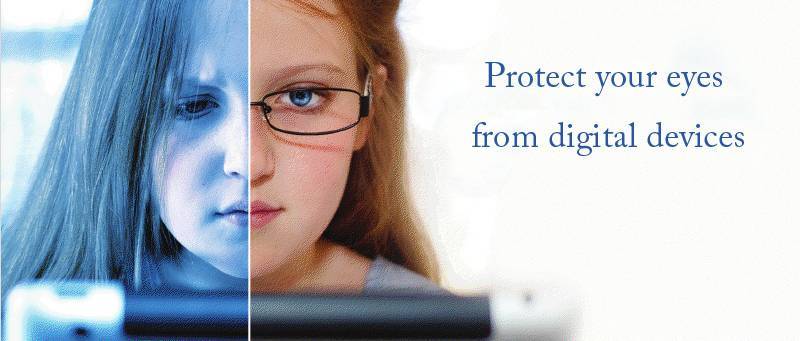Are Video Games and Computers Bad for Your Eyes?
 Above: Patient wearing computer glasses designed to reduce eye strain and fatigue
Above: Patient wearing computer glasses designed to reduce eye strain and fatigue
By Anita Tieu, Doctor of Optometry Senior Intern
How are video games and electronic devices integrated into our lives?
With the numerous electronic devices available, video games have become a large part of entertainment for adults and children of all ages. Studies have shown that American children between the ages of 8 to 18 years old spend approximately 7.5 hours per day using electronic devices (4.5 hours per day watching TV, 1.5 hours per day using the computer and more than 1 hour per day playing video games).
How do video games and computers affect our eyes?
With the amount of time invested into using electronic devices, it is not surprising that 64-90% of users experience visual symptoms. Users may experience visual symptoms such as: eyestrain, headaches, ocular discomfort, dry eye, double vision and blurred vision. Factors contributing to these symptoms include: lowered blink rate, poor blink quality, reduced eye focusing abilities, reduced visual acuity and poor eye alignment abilities. In addition, a large proportion of the light emitted from computer screens, smart phones, iPads and other similar devices consist of blue light. Blue light has been shown to have damaging effects on the retina contributing to a higher risk of macular degeneration, a blinding eye disease.
Dry Eye
It has been shown that when engrossed in the use of electronic devices, the frequency and quality of blinks are reduce. Blinking is very important for replenishing the tear film coating on our eyes. The tear film plays an essential role in keeping our eyes well moisturized, healthy and comfortable. A poor tear film can result in ocular irritation, symptoms of burning and gritty eyes.
Blurred Vision and Headaches
Myopia (nearsightedness), hyperopia (farsightedness) and astigmatism are eye conditions that can often be corrected with prescription glasses or contact lenses. These eye conditions can contribute to blurred vision when using electronic devices and when reading. Accommodation is the ability to focus on near objects. When accommodation is inaccurate, meaning that if one’s eyes are over focusing or under focusing, this can also lead to intermittent blurred vision and can also contribute to headaches. When playing games on devices such as iPads, hand-held gaming electronics and smart phones, our visual system has to work to maintain focus for the one particular distance for an extended period of time. Much like holding up a light weight with one arm where it initially may feel easy, and as time passes by, the muscles in our arms begin to fatigued and become strained. This phenomenon can be applied to the visual system, where exerting such effort for extended periods of time can lead to eyestrain and headaches.
Ocular Alignment
Our eyes have a natural tendency to converge when viewing objects at near. In order to maintain clear, comfortable, singular vision, good eye teaming skills are required. Poor eye teaming skills can result in discomfort of the eyes, head tilt or head turn, and double vision when reading.
Damage Caused by Blue Light
Blue light has been shown to cause retinal cell death which in turn contributes to a higher risk of acquiring age-related macular degeneration, an irreversible vision loss. Ocular protection from blue light is as much as important as protecting our eyes from UV light. In addition, blue light has been shown to affect circadian rhythms. Exposure to blue light before bed may disrupt sleep at night.
Tips to make video gaming more vision friendly
1. Follow the 20-20-20 rule. Take a break from the media device every 20 minutes by looking at an object greater than 20 feet away for 20 seconds.
2. Change the position of media device so that the viewing angle is slightly downward to increase eye surface coverage.
3. Visit your local Optometrist for your most up to date glasses prescription and for a thorough assessment of your eye health. Futher assessment with a Developmental Optometrist may be required if glasses and eye drops do not relieve symptoms. Developmental Optometrists can prescribe a program of eye exercises (vision therapy) to eliminate symptoms of eye straing, blurry and double vision.
4. Reduce the amount of glare and blue light by having a glare reducing screen or by having a good quality anti-reflective coating on your glasses. Some optical companies even design blue-light blocking lenses for gaming purposes.